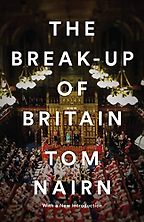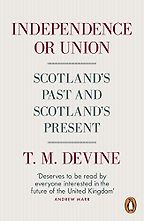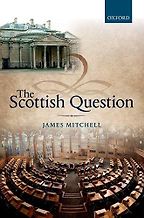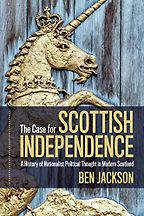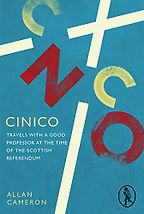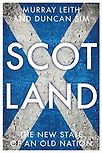Before we talk books, let me kick off our conversation by saying that since the creation of the Scottish parliament in 1999, there has been a sharp rise in support for Scottish independence. In your book Scotland: The New State of an Old Nation, you trace the rise of Scottish nationalism from the end of the Second World War. Could you reflect a little on how Scotland’s sense of itself as a nation has changed in the last few decades?
1945, the end of the Second World War, was a very challenging period—socially and economically—but that was the high point of Britishness. While those in Scotland felt Scottish, and strongly Scottish, that was allied to a very strong sense of Britishness. That was reflected in a number of ways—in the party political results over the next few elections, in the expressions of support that icons of Britishness received. But at the same time, it was in the 1950s that a petition for a Scottish parliament, or a Scottish assembly in Scotland within the constitution of the kingdom, got about two million signatures.
If we leap forward to now, eighty years later, that strong sense of Scottishness hasn’t gone anywhere, but the sense of Britishness has declined quite significantly. The story of the first two decades of this century has been a story of that sense of Scottish identity making itself more strongly felt throughout society. It’s certainly more expressive, it’s more confident in itself, it’s more assertive overall.
Get the weekly Five Books newsletter
What’s changed in Scotland, especially since devolution, but also a couple of decades prior, is that there is a sense of Scotland saying: ‘yes, we want change, we’ve asked before and it hasn’t happened, and this time we’re serious about it.’ That’s what’s different—not necessarily just in political circles, but across the whole of society.
Several of the authors of the books we’re going to look at today will tell you that inside every Scot, there’s a nationalist. But there’s a difference between a small-n nationalist and a big-N Nationalist. Small-n nationalists are Scottish to the core, and are proud of being Scottish, but they don’t necessarily support independence. Big-n Nationalists not only assert their identity socially and culturally, but they do so politically too: they support nationalist parties, and they want independence.
Can we talk about the word ‘nationalism’? Because it normally has very negative connotations. But in the Scottish context—and specifically in the case of the Scottish National Party, which has been in power in Scotland since 2007, and is considered centre-left and progressive—there seems to have been a detoxification of that term. Would you agree?
Absolutely. I don’t think ‘detoxification’ is right, because I don’t necessarily think that the idea of Scottish nationalism has ever been strongly toxic. For many decades, until the 1960s, the SNP was a fringe party. And even after their first breakthrough—they had a high water mark in the 1974 elections—post-1979, they were back in the doldrums for a couple of decades. So it’s really devolution that has allowed them to flourish. And boy, have they flourished.
But I think that comes back to the point that the strong sense of Scottish identity, and belonging to the nation, has always been an element of what it is to be Scottish—even if you go back to 1707, when Scotland voted itself out of existence as a state, and joined the United Kingdom. But it never voted itself out of existence as a nation.
Right. So that’s a distinction we should linger on for a moment. Scotland’s statehood was absorbed into the United Kingdom under the Act of Union, but it remained a ‘nation’ in as much as it continued to exist as a cultural and political entity.
Also, in Scotland, the nationalism presented by the SNP and the Green parties is a more civic sense of nationalism, rather than a purely ethnic sense of nationalism. Many of the arguments put forward for Scottish nationalism come from the left, so it has been divorced from some of the other historical nationalisms, which have been much more muscular and less positive or inclusive. There are, however, arguments about just how civic Scottish nationalism is. It may well be that the political elites present a much more inclusive sense of belonging than the masses would, perhaps, as they express it.
That makes sense. Let’s look at your book recommendations. The first book on Scottish nationalism that you have selected is The Breakup of Britain by Tom Nairn.
This is the earliest book in my selection. It’s a collection of essays that Nairn wrote in the 1970s, mostly originally published in the New Left Review—because he is very openly Marxist. This was a period when left-versus-right was a big issue, and—unlike a lot of Marxists—he was arguing for nationalism, which wasn’t always popular. Traditionally, the left presents a very encompassing worldview, whereas nationalism is far from that. So he upset a few people in that regards. The book was republished in the early 1980s, again in the early 2000s, and it was recently republished with a new foreword.
Nairn makes some strong left-wing arguments for what he calls a ‘radical neo-nationalism’, because Scottish political nationalism was considered to be outwith the normal trends—it hadn’t cropped up when there was a wave of nationalism in Europe in the 1800s, or when there was another wave of nationalism around the world in the 1900s. So why did it come back on the scene in the 1960s and 1970s?
What Nairn’s arguments bring together is the trajectory of Scottish nationalism. He talks about the decline of the United Kingdom as a geopolitical power, and how uneven economic development is an inherent part of the UK, as he sees it. He talks about how the UK was foundering on constitutional crises; they’d appointed a Royal Commission in the early 1970s to look at devolution, and one of the classic comments about a British Royal Commission is that they spend years taking minutes. It was very much an attempt to kick constitutionalism into the long grass. What Nairn was seeking to do with the essays in The Breakup of Britain was say: ‘Let’s not fall for this, folks. We’re on a roll here, let’s keep pushing forwards.’
“Scotland voted itself out of existence as a state, but it never voted itself out of existence as a nation”
The other thing that I find is interesting is that, when it was published for a second time in the 1980s, he wrote a new foreword. As I say, he’s a Marxist, and very challenging of Thatcherite monetarism. But if you read it now, it could almost have been written today. Once again, you have Britain seeking a role in the world, foundering on internal challenges around the constitutional structure, and the uneven economic development of the different regions—because while we’re talking about Scottish nationalism, and this book is very much focused on Scotland, it does cover a little of Northern Ireland, Wales, and English nationalism. Almost fifty years on, it’s almost like we’ve come full circle, because the issues and challenges are coming up again.
We should talk a little about the other nations of the United Kingdom. Northern Ireland is obviously its own separate issue, but is it not notable that Scotland has such a strong nationalist movement at the moment, while—at least from the outside—it would appear that there is far less separatist sentiment in Wales?
That’s always been an interesting question. While the SNP are the predominant party in Scotland in a way that most parties wish they were predominant—they’ve absolutely blitzed the last few elections—this is not the case in Wales with the party in power. In Wales, it’s the Welsh Labour Party. But I would argue that we’re back to the small-n nationalism versus big-n Nationalism—nobody could go to Wales and accuse members of the Labour Party of not being nationalists. But for much of its life, the nationalist party in Wales. Plaid Cymru has not necessarily been focused on independence and self-government, unlike the SNP.
Wales has always been much more focused on the cultural aspects, on maintaining a cultural sense of identity. You have to go back to the roots of the country, you have to understand the history—nationalism is always drawing from the past.
You could have an argument with a lot of Welsh historians and Welsh nationalists on this point, but Wales was absorbed firmly into the English legal system around the time of the Tudors, while Scotland established itself as an independent country for several centuries before it chose to join into a political union.
I think that might bring us to the next of your Scottish nationalism book recommendations: Tom Devine’s Independence or Union: Scotland’s Past and Scotland’s Present.
Yes. This is a history book. Devine has been described as ‘Scotland’s preeminent historian’, which has probably made a number of other historians upset! Scotland is a country blessed with a number of fantastic historians, and Devine is certainly one of them. What this work does is provide you with an understanding of Scotland all the way back from the Act of Union.
When Scotland became part of the United Kingdom, it maintained its own legal system, its own educational system, and its own church. Those three elements have sometimes been called the ‘milking stool’ of Scottish nationalism, the three legs that maintain the sense of national identity whilst what we think of as the modern state began to emerge.
Devine does an excellent job of asking why the union came about in the first place, because it wasn’t that popular in certain parts of Scotland back in the early 1700s, I can tell you. So how did it manage to survive, and why was the union so popular later on? He also talks about how Scottish identity seemed to flourish within the union, which is surprising to some, because when a small country gets into bed politically, socially and culturally with a bigger country, it often gets absorbed. He addresses all these questions and does an excellent job of talking us through the various periods of history and illustrating how the union was, at various times, more strong and less strong.
Five Books interviews are expensive to produce. If you're enjoying this interview, please support us by donating a small amount.
Throughout it all, he considers Scottish national identity and Scottish nationalism—which wasn’t necessarily political, but it was a cultural and social force. One of the great icons of Scotland is the Wallace Monument in Stirling, a monument to William Wallace that was built during one of the heydays of unionism. So, hold on: we’ve all seen Braveheart. He was fighting the English, fighting for Scottish independence. How could it be that they erected a tower in his honour as a symbol of unionism? But that’s exactly what they did. It was a symbol of the Scottish identity, firmly within the Union. That only illustrates the changing nature of nationalism.
Because this book was written after the 2014 independence referendum, that’s where Scotland’s present comes into it. As a historian, he points out some of the issues that continue to exist. And that’s a good segue to my next book.
Which is James Mitchell’s The Scottish Question. This book was published in 2014.
James Mitchell is a professor of public policy at Edinburgh University. Previously he was at Strathclyde. In many ways, what he does here is very similar to what Devine does. But Mitchell does it from the political and governance perspectives, which is also vastly interesting.
When he says ‘the Scottish question’, he doesn’t mean there’s a single question. It’s in the broader sense, the way people used to talk about ‘the Schleswig Holstein question,’ or how we might talk about ‘the Korean question’, meaning the divide between North and South Korea. The Scottish question brings in a ton of issues and ideas and problems of various times. One of the very funny statements he makes in the book is when he relates the Scottish question to the previous Irish question; every time they came up with an answer, he says, they changed the question. What it illustrates is that the nature of Scottish nationalism changes over time—nationalism today would be unrecognisable to the Scottish nationalists of eighty to a hundred years ago.
“When Scotland became part of the United Kingdom, it maintained its own legal system, its own educational system, and its own church”
Earlier we talked about how England and Scotland came together and formed a union, the United Kingdom. You asked about how Scotland maintained itself within that. Devine’s point is, and Mitchell also talks about, how if you go back 150 years, people’s contact with central government was almost non-existent. You might have had contact with government at a local level. But that’s what help Scotland maintain its own identity. It was left to look after itself.
Mitchell looks at the transformation from what a lot of political scientists and social scientists call the ‘nightwatchman state’, a small and limited state just there to keep the peace, into the modern state, which is integrated fully with society. So what happens through all that is that Scotland created firmly Scottish institutions. First there was the creation of the Secretary of State for Scotland, who was Scotland’s champion in Whitehall.
That is, the seat of the British government in London. As opposed to ‘Westminster’, the British parliament. For the benefit of our international readers.
Indeed, I think Mitchell compares the Secretary of State for Scotland to Oliver Twist—continually asking for more. Which is exactly what their job is.
And before we had devolution at the end of the 20th century—or rather, legislative devolution—we had administrative devolution, the Scottish Office. When it came to Scotland, the Scottish Office was primary, and it made decisions that would have been made in other departments for England and Wales.
As I said, Mitchell does an excellent job of illustrating the distinct nature of Scotland and the Scottish question over time. He shows that while the politics change, and Scottish nationalism changes, the question changes, but it always remains a question. He wrote this as we were heading into 2014.
The year of the independence referendum.
As he writes, we don’t know the result. So it’s fascinating, very insightful. Because as he illustrates, there can be no definitive answer to the Scottish question, because the question may change again. As fundamental changes have taken place across the UK and within UK society, Scotland and Scottish nationalism has continued to adapt.
Ultimately the Scottish electorate voted no, 55% to 45%. I remember commentators on the night repeating the mantra that ‘whatever the result, the winner was democracy’—because it was a peaceful vote, with an enormous turnout. Is that unusual, for a country to consider and then reject its own dissolution without resorting to violence?
I don’t think so. There have been other examples. Everyone points to the so-called ‘Velvet Divorce’ of the Czech Republic and Slovakia. And, if I can go back to Mitchell, one of the points he makes very clearly is that, even if Scotland votes for independence, it’s not going to mean an end of Britishness. Britishness will still be a very strong identity, and the relationship between Scotland and England is going to continue.
Brexit has illustrated how a clean break doesn’t work; Britain has been part of Europe for fifty years. Well, Scotland has been part of the United Kingdom for over 300. So, irrespective of what decision the Scottish people may take in the future, there is going to be an evolving sense of Scottishness that is firmly allied to that sense of Britishness. You can’t talk about Scotland, even in its early days—during the wars of independence in the late 1200s and early 1300s—without referring to England.
To come back to a point I made earlier: plenty of nations have come and gone throughout history, but though Scotland stopped being a state, it didn’t stop being a nation. Scotland has been a constant throughout the last thousand years or more. It stopped being a sovereign state, but it continued to appear on maps, and continued to exist in the minds of Scottish people. Benedict Anderson once famously said that a nation is an imagined community of the mind. And he’s not wrong.
I can very much see a future where Scotland votes for independence. It didn’t last time, and it might not next time. I could point to the example of Quebec, which came a lot closer than Scotland did in 2014. In 1995, Quebec came within about a percentage point of voting for independence. But it’s no longer on the political agenda in Quebec right now.
So, it could happen. It could not happen. But what will definitely happen is that the idea of Scotland and sense of Scottish national identity, and sense of Scottish nationalism—whether small-n or big-N—will continue.
Let’s talk about Ben Jackson’s book The Case for Scottish Independence: A History of Nationalist Political Thought in Modern Scotland.
This is the most recent. It’s a history of nationalist political thought in modern Scotland. It’s absolutely fantastic. Jackson brings together the work of people like Nairn—those that came before him and those that came since. Jackson illustrates not the changing nature of Scotland as touched on by Devine—the changing societal and cultural aspects—nor the changing political and policy aspects highlighted so well by Mitchell—but how the case for Scottish independence has changed over time. If there’s anything that political movements love to do, it’s argue about what their objectives are.
The thing you must remember about Scottish nationalism, and Jackson touches on this, is that it represents itself as left, or left-of-centre. Many of its adherents are very firmly on the left. And indeed, you must not make the mistake of equating the SNP with Scottish nationalism; they are only part of the Scottish nationalist movement. They’re the big one in the room, but there are other parties.
Notably the Scottish Green Party, which is currently in an informal coalition with the SNP minority government in Holyrood. And Alex Salmond’s controversial splinter group Alba, among others.
What Jackson does, and I think he does well, is show the evolution of the arguments about why Scotland should be independent. At various times there have been strong pushes for Scotland to be self-governed, or to have ‘Devo Max’, and people have also spoken, historically about Home Rule. Now, of course, the big focus is on independence—on being an independent sovereign state. Jackson also talks about the big thinkers of the Scottish nationalist movement, both historic and contemporary.
Change is the theme that draws all of these recommended books together—the constant change that Scottish nationalism has undergone—whether we’re talking socially, culturally, policy-related, politically, or even the intellectual driving force behind it. There are times when it has been very dogmatic. Times when it has been very pragmatic. And that’s certainly true of the SNP, as the major political party in Scotland today.
Next up, you’ve selected a work of fiction I wasn’t previously familiar with: Allan Cameron’s Cinico: Travels with a Good Professor at the time of the Scottish Referendum.
This is not an academic work, it’s a novel. A very amusing one, actually. ‘Cinico’ is the Italian word for ‘Cynical or cynic. It’s basically a modern version of Voltaire’s Candide, which has been translated from the French as ‘The Optimist’ or ‘Optimism’.
It pretends to be a book about an Italian journalist based in London who is sent up to cover the Scottish referendum in 2014. He makes contact with a Scottish professor of politics. Perhaps that’s what I love about it, how many novels are there written about professors of Scottish politics? I had to choose it.
It moves through the journalist’s attempts to find the stories behind the referendum, nationalism, and Scottish identity, and he undergoes his own journey, like any good protagonist in a novel. But what I love is the characters he meets along the way—some classic characters like the Glasgow hard man, a real trope of Scottish identity, but also many varied ones from a variety of backgrounds—and all present insights for the reader. Through that we get exposed to all the ideas behind Scottish independence and what it means to be Scottish in 2014.
The professor comes in for a good kicking, because he’s represented as very middle class, and a little bit out of touch with wider society. But at the end of the day, I think it illustrates the multifaceted nature of Scottishness and Scottish identity, and Scottish society in 2014. Because remember—and I must stress this—that 2014 was, in many ways, amazing. Think of the turnout alone.
Just short of 85%.
You almost never see turnouts like that, except in rare cases—or when you are a little suspicious of the situation. But in many ways this was a celebration of democracy. The vast majority of people went out to vote on what they saw as a very important question. If you told most people two or three years before the vote that, although the nationalists wouldn’t win, they’d get 45% of the vote, you’d have gotten laughed out of most rooms.
And it does seem to reflect a long term shift in voting patterns. Post-Brexit, there have been periods of weeks or months where polling has suggested a majority in favour of independence. Between June 2020 and January 2021, for example.
I think what that goes to show is that Scotland has had a very mature, but more importantly, a very public and very open discussion of what it wanted. It also challenged some of those nationalist thinkers to come up with a much more frank consideration of the changes that independence would bring. Jackson does a good job of showing that.
For Scotland, it caused a lot of reaction, like any debate that talks about rupturing a long-held civic and political union. There were families who had major disagreements. Political parties that had major disagreements. At the end of the day, that’s when the SNP made the shift from being the dominant party of Scotland, not only in the Scottish Parliament—which they’d already achieved—but in Westminster too. In the 2015 general election they blew every other party out of the water. Nobody saw that coming. That’s when Scottish nationalists also began to think, ‘whoa, whoa, whoa, we’ve got to harness this, we’ve got to do it again.’ So, even after 2014, it is worth asking, did they really lose?
Interview by Cal Flyn, Deputy Editor
January 10, 2022
Five Books aims to keep its book recommendations and interviews up to date. If you are the interviewee and would like to update your choice of books (or even just what you say about them) please email us at [email protected]
